|
Books Should Be Free Loyal Books Free Public Domain Audiobooks & eBook Downloads |
|
|
Books Should Be Free Loyal Books Free Public Domain Audiobooks & eBook Downloads |
|
Plays |
|---|
|
Book type:
Sort by:
View by:
|
By: George Bernard Shaw (1856-1950) | |
|---|---|
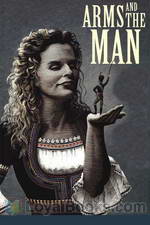 Arms and the Man
Arms and the Man
Arms and the Man is a comedy by George Bernard Shaw that takes place in 1885, during the Serbo-Bulgarian War. Raina Petkoff is engaged to the gallant Sergius Saranoff, hero of the recent Bulgarian victory over the Serbs. But she is distracted by the abrupt arrival of Captain Bluntschli, a Swiss mercenary who fought for the Serbian army. He takes refuge in her bedroom after the battle and although he is initially threatening, reveals that he carries chocolates instead of bullets. Will Raina marry the posturing Sergius or the chocolate cream soldier? Extra intrigue is provided by saucy servant girl Louka, her dour fiance Nicola, and Raina's hand-wringing parents. | |
 Mrs. Warren's Profession
Mrs. Warren's Profession
The story centers on the relationship between Mrs Kitty Warren, a rich woman, described by the author as "on the whole, a genial and fairly presentable old blackguard of a woman" and her daughter, Vivie. Mrs Warren is a middle-aged woman whose Cambridge-educated daughter, Vivie, is horrified to discover the morally questionable way her mother acquired her fortune. | |
 The Doctor's Dilemma
The Doctor's Dilemma
The Doctor's Dilemma is about Dr. Colenso Ridgeon, who has recently been knighted because of a miraculous new treatment he developed for tuberculosis. As his friends arrive to congratulate him on his success, he is visited by two figures who present him with a difficult decision. He has room for one more patient in his clinic; should he give it to Louis Dubedat, a brilliant but absolutely immoral artist, or Dr. Blenkinsop, a poor and rather ordinary physician who is a truly good person? Dr. Ridgeon's dilemma is heightened when he falls for Jennifer Dubedat, the artist's wife, who is innocent of her husband's profligacy. | |
By: Friedrich Schiller (1759-1805) | |
|---|---|
 Mary Stuart
Mary Stuart
Schiller's tragedy depicts the final days of Mary, Queen of Scots, who has been imprisoned by her cousin, Queen Elizabeth I, because of her potential claim on the English throne. The action of the play revolves around an attempt to rescue Mary from prison and Elizabeth's indecision over whether or not to have her executed. The 1801 translation is by Joseph Mellish, a friend of Schiller's. | |
 Love and Intrigue
Love and Intrigue
Ferdinand is an army major and son of President von Walter, a high-ranking noble in a German duke's court, while Luise Miller is the daughter of a middle-class musician. The couple fall in love with each other, but both their fathers tell them to end their affair. The President instead wants to expand his own influence by marrying Ferdinand to Lady Milford, the duke's mistress, but Ferdinand rebels against his father's plan and tries to persuade Luise to elope with him. | |
 Camp of Wallenstein
Camp of Wallenstein
This is the first play of Friedrich Schiller's Wallenstein Trilogy. Set in a Bohemian camp during the Thirty Years War, it introduces the major characters of the rest of the trilogy, like Albrecht von Wallenstein and Max Piccolomini, from their subordinates' point of view. | |
By: Sophocles (495-406 BC) | |
|---|---|
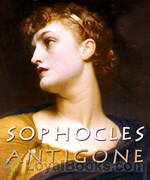 Antigone
Antigone
This is the final installment in Sophocles's Theban Plays, following Oedipus Rex and Oedipus at Colonus. Oedipus's daughter Antigone deliberately breaks the laws of Thebes when she buries her brother's body and is sentenced to death. She clashes with Creon, the King of Thebes, over what constitutes justice and morality: the laws of the state or the laws of the individual. | |
 Electra
Electra
Sophocles' play dramatizes the aftermath of Agamemnon's murder by his wife Clytemnestra and her lover Aegisthus. His daughter Electra is hungry for revenge and longs for the return of her brother Orestes to help her achieve her ends. | |
By: G. K. Chesterton (1874-1936) | |
|---|---|
 Magic: A Fantastic Comedy
Magic: A Fantastic Comedy
| |
By: Christopher Marlowe (1564-1593) | |
|---|---|
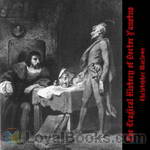 The Tragical History of Doctor Faustus
The Tragical History of Doctor Faustus
The Tragical History of Doctor Faustus, normally known simply as Doctor Faustus, is a play by Christopher Marlowe, based on the Faust story, in which a man sells his soul to the devil for power and knowledge. Doctor Faustus was first published in 1604, eleven years after Marlowe's death and at least twelve years after the first performance of the play. | |
 The Jew of Malta
The Jew of Malta
Christopher “Kit” Marlowe (baptised 26 February 1564 – 30 May 1593) was an English dramatist, poet, and translator of the Elizabethan era. The foremost Elizabethan tragedian before William Shakespeare, he is known for his magnificent blank verse, his overreaching protagonists, and his own untimely death. The Jew of Malta (1589) is an original story of religious conflict, intrigue, and revenge, set against a backdrop of the struggle for supremacy between Spain and the Ottoman Empire in the Mediterranean... | |
 Tamburlaine the Great
Tamburlaine the Great
Tamburlaine the Great is the name of a play in two parts by Christopher Marlowe. It is loosely based on the life of the Central Asian emperor, Timur 'the lame'. Written in 1587 or 1588, the play is a milestone in Elizabethan public drama; it marks a turning away from the clumsy language and loose plotting of the earlier Tudor dramatists, and a new interest in fresh and vivid language, memorable action, and intellectual complexity. Along with Thomas Kyd's The Spanish Tragedy, it may be considered the first popular success of London's public stage... | |
 Tragical History of Doctor Faustus (1616 version)
Tragical History of Doctor Faustus (1616 version)
The Tragicall History of the Life and Death of Doctor Faustus, commonly referred to simply as Doctor Faustus, is a play by Christopher Marlowe, based on the Faust story, in which a man sells his soul to the devil for power and knowledge. Doctor Faustus was first published in 1604, eleven years after Marlowe's death and at least twelve years after the first performance of the play. "No Elizabethan play outside the Shakespeare canon has raised more controversy than Doctor Faustus. There is no agreement concerning the nature of the text and the date of composition... | |
 Edward II
Edward II
Christopher Marlowe's Elizabethan tragedy focuses on the downfall of King Edward II, whose love for his favorite courtier, Piers Gaveston, leads to rebellion. | |
By: Oliver Optic (1822-1897) | |
|---|---|
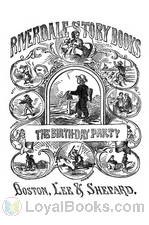 The Birthday Party, A Story For Little Folks
The Birthday Party, A Story For Little Folks
Flora Lee’s birthday came in July. Her mother wished very much to celebrate the occasion in a proper manner. Flora was a good girl, and her parents were always glad to do any thing they could to please her, and to increase her happiness. | |
By: J. M. Barrie (1860-1937) | |
|---|---|
 Dear Brutus
Dear Brutus
At a house in the country 8 guests are invited to enter a magical wood to see what might have happened had they made a different choice in life. Even though they are warned away from the wood, they take a chance and enter. The title comes from Shakespeare: "The fault lies in our selves, dear Brutus, not in our stars...," and summarizes the theme of this play: given a second chance, will people still make the same mistakes? | |
By: George Bernard Shaw | |
|---|---|
 Candida
Candida
Candida, a comedy by playwright George Bernard Shaw, was first published in 1898, as part of his Plays Pleasant. The central characters are clergyman James Morell, his wife Candida and a youthful poet, Eugene Marchbanks, who tries to win Candida's affections. The play questions Victorian notions of love and marriage, asking what a woman really desires from her husband. The cleric is a Fabian Socialist, allowing Shaw—himself a Fabian—to weave political issues, current at the time, into the story. | |
 Major Barbara
Major Barbara
George Bernard Shaw's Major Barbara focuses on the family of aristocratic Lady Britomart Undershaft and her estranged husband Andrew, a millionaire armaments manufacturer. Their daughters Sarah and Barbara are both engaged to be married, and Lady Britomart decides to ask Andrew for monetary support. Barbara is a Major in the Salvation Army, and agrees to let her father visit the mission in the East End of London where she works. In exchange, she agrees to visit his munitions factory. The conflict between Barbara's philanthropic idealism and her father's hard-headed capitalism clash when he decides he wants to fund the Salvation Army... | |
 Don Juan in Hell
Don Juan in Hell
Don Juan in Hell is an excerpt (Act 3, Scene 2) from George Bernard Shaw’s Man and Superman. It is often performed as a stand-alone play. In it, three characters from Mozart’s Don Giovanni (Don Juan, Dona Ana, and the statue of the Commendatore, Dona Ana’s father) meet in Hell and, joined by the Devil, have a philosophical debate on a variety of subjects, including Heaven and Hell, men, women and marriage. In the end, they all decide where they will spend eternity. | |
 Heartbreak House
Heartbreak House
On the eve of World War I, Ellie Dunn, her father, and her fiancé are invited to one of Hesione Hushabye’s infamous dinner parties. Unfortunately, her fiancé is a scoundrel, her father’s a bumbling prig, and she’s actually in love with Hector, Hesione’s husband. This bold mix of farce and tragedy lampoons British society as it blithely sinks towards disaster. | |
 Caesar and Cleopatra
Caesar and Cleopatra
| |
 Misalliance
Misalliance
Misalliance, a 1910 play by George Bernard Shaw, is an ironic examination of the romantic entanglements of a varied group of people gathered at a wealthy man's country home on a summer weekend. Most of the romantic interest centers on the host's daughter, Hypatia Tarleton, a typical Shaw heroine who exemplifies his lifelong theory that in courtship, women are the relentless pursuers and men the apprehensively pursued. Hypatia is the daughter of newly-wealthy John Tarleton who made his fortune in the unglamorous but lucrative underwear business... | |
By: Richard Harding Davis (1864-1916) | |
|---|---|
 Miss Civilization
Miss Civilization
Miss Civilization, a one act comedy, tells the story of a young woman who matches wits with three burglars attempting to rob her house. | |
By: Lord George Gordon Byron (1788-1824) | |
|---|---|
 Manfred
Manfred
Manfred is a dramatic poem in three acts by Lord Byron, and possibly a self confessional work. A noble, Manfred, is haunted by the memory of some unspeakable crime. In seeking for forgetfulness and oblivion, he wanders between his castle and the mountains. He has several encounters with the people who try to assist him, as well as spirits that rule nature and human destiny. The poem explores themes of morality, religion, guilt and the human condition. | |
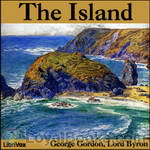 The Island
The Island
Written late in his career, Byron's narrative poem The Island tells the famous story of the mutiny on board the Bounty, and follows the mutineers as they flee to a South Sea island, "their guilt-won Paradise." | |
By: Gertrude Stein (1874-1946) | |
|---|---|
 Geography and Plays
Geography and Plays
Geography and Plays is a 1922 collection of Gertrude Stein's "word portraits," or stream-of-consciousness writings. These stream-of-consciousness experiments, rhythmical essays or "portraits", were designed to evoke "the excitingness of pure being" and can be seen as literature's answer to Cubism, plasticity, and collage. Although the book has been described as "a marvellous and painstaking achievement in setting down approximately 80,000 words which mean nothing at all," it is considered to be one of Stein's seminal works. | |
By: Anton Chekhov (1860-1904) | |
|---|---|
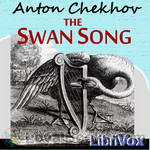 Swan Song
Swan Song
In 'The Swan Song' an aging actor reminisces about his life and the parts he's played. The piece takes a tragic look at ambition and the sacrifices that must be made in order to succeed. Chekhov’s ability to capture and explore human nature and experience is showcased here. | |
 Ivanov
Ivanov
Nicolai (anglicised Nicholas in this translation) Ivanov, a middle-aged public servant, is unhappy. His wife Anna, disinherited by her family after converting from Judaism, is dying of tuberculosis. He is deeply in debt. And his best friend’s daughter is infatuated with him. Comedy and tragedy ensue in truly Chekhovian fashion. An example of the young Chekhov’s maturing style, Ivanov is an early harbinger of themes that would recur throughout his work. | |
By: August Strindberg (1849-1912) | |
|---|---|
 Countess Julie
Countess Julie
August Strindberg’s naturalistic one-act drama has only three characters: Julie, a passionate young noblewoman; Jean, her father’s ambitious valet; and Kristin, the cook, who is also Jean’s fiancee. The play is set on Midsummer Eve, when everyone is reveling, and Julie and Jean get a bit too intimate – with tragic results. | |
 Creditors
Creditors
Creditors is an 1889 tragicomedy by August Strindberg that plumbs the depths of the twisted triangular relationship between Tekla, her husband Adolph, and her ex-husband Gustav. | |
By: Robert Browning (1812-1889) | |
|---|---|
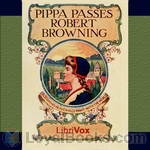 Pippa Passes
Pippa Passes
Pippa Passes was a dramatic piece, as much play as poetry, by Robert Browning published in 1841 as the first volume of his Bells and Pomegranates series. The author described the work as the first of a series of dramatic pieces. His original idea was of a young, innocent girl, moving unblemished through the crime-ridden neighbourhoods of Asolo. The work caused outrage when it was first published, due to the matter-of-fact portrayals of many of the area’s more disreputable characters – notably the adulterous Ottima – and for its frankness on sexual matters... | |
By: Aeschylus (525/524 BC - c. 455/456 BC) | |
|---|---|
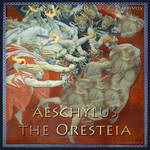 The Oresteia
The Oresteia
The Oresteia is a trilogy by Aeschylus, one of the foremost playwrights of ancient Greece. It encompasses three plays: Agamemnon, The Libation Bearers, and The Furies. It tells the tragic tale of the House of Atreus, whose inhabitants have been cursed and are doomed to play out their bloody, vengeful destinies. At the beginning of the first part, the Trojan War has ended and the Greek general, Agamemnon, is returning victorious to his wife Clytemnestra. Yet she finds it difficult to forgive his sacrifice of their daughter, Iphigenia, who was killed to ensure the Greek fleet fair winds in their voyage to Troy... | |